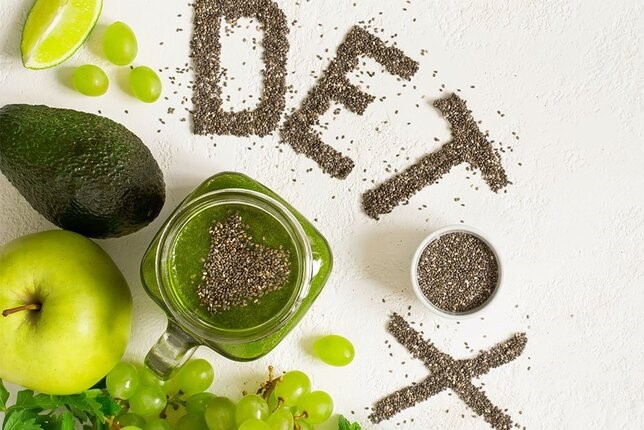
"Detoxification" and "cleanses": what you need to know about "detox”
What are “detoxes” and “cleanses”? We have been hearing about detox for some time, and it is therefore appropriate to deepen this topic
A variety of “detoxification” diets, regimens, and therapies—sometimes called “detoxes” or “cleanses”—have been suggested as ways to remove toxins from your body, lose weight, or promote health.
“Detox” programs may involve a single process or a variety of approaches
These include:
- Fasting
- Drinking only juices or similar beverages
- Eating only certain foods
- Using dietary supplements or other commercial products
- Using herbs
- Cleansing the colon (lower intestinal tract) with enemas, laxatives, or colon hydrotherapy (also called “colonic irrigation” or “colonics”)
- Reducing environmental exposures
- Using a sauna.
These programs may be advertised commercially, offered at health centers, or part of naturopathic treatment.
Some “detoxification” programs can be unsafe and falsely advertised.
What does the research say about “detoxes” and “cleanses”?
There have been only a small number of studies on “detoxification” programs in people.
While some have had positive results on weight and fat loss, insulin resistance, and blood pressure, the studies themselves have been of low quality—with study design problems, few participants, or lack of peer review (evaluation by other experts to ensure quality).
A 2015 review concluded that there was no compelling research to support the use of “detox” diets for weight management or eliminating toxins from the body.
A 2017 review said that juicing and “detox” diets can cause initial weight loss because of low intake of calories but that they tend to lead to weight gain once a person resumes a normal diet.
There have been no studies on long-term effects of “detoxification” programs.
What about safety?
The U.S. Food and Drug Administration (FDA) and Federal Trade Commission (FTC) have taken action against several companies selling detox/cleansing products because they (1) contained illegal, potentially harmful ingredients; (2) were marketed using false claims that they could treat serious diseases; or (3) in the case of medical devices used for colon cleansing, were marketed for unapproved uses.
Some juices used in “detoxes” and “cleanses” that haven’t been pasteurized or treated in other ways to kill harmful bacteria can make people sick.
The illnesses can be serious in children, elderly people, and those with weakened immune systems.
Some juices are made from foods that are high in oxalate, a naturally occurring substance.
Two examples of high-oxalate foods are spinach and beets.
Drinking large quantities of high-oxalate juice can increase the risk for kidney problems.
People with diabetes should follow the eating plan recommended by their health care team.
If you have diabetes, consult your health care providers before making major changes in your eating habits, such as going on a “detox” diet or changing your eating patterns.
Diets that severely restrict calories or the types of food you eat usually don’t lead to lasting weight loss and may not provide all the nutrients you need.
Colon cleansing procedures may have side effects, some of which can be serious.
Harmful effects are more likely in people with a history of gastrointestinal disease, colon surgery, severe hemorrhoids, kidney disease, or heart disease.
“Detox” programs may include laxatives, which can cause diarrhea severe enough to lead to dehydration and electrolyte imbalances
Drinking large quantities of water and herbal tea and not eating any food for days in a row could lead to dangerous electrolyte imbalances.
Take charge of your health—talk with your health care providers about any complementary health approaches you use, including any “detoxes” or “cleanses.”
Together, you and your health care providers can make shared, well-informed decisions.
Are all fasting programs considered “detoxes” and “cleanses”?
Although some fasting programs are advertised with “detoxification” claims, other fasting programs—including intermittent fasting and periodic fasting—are being researched for health promotion, disease prevention, improved aging, and in some cases weight loss.
But there are no firm conclusions about their effects on human health.
Also, fasting can cause headaches, fainting, weakness, and dehydration.
Read Also
Emergency Live Even More…Live: Download The New Free App Of Your Newspaper For IOS And Android
What Is Detox And Why Is It Important
Mediterranean Diet: Getting Back In Shape Relies On Anti-Ageing Foods
Mindful Eating: The Importance Of A Conscious Diet
In Search Of A Personalised Diet
The Diabetic Diet: 3 False Myths To Dispel
Why Is Everyone Talking About Intuitive Eating Lately?
Climate Change: The Environmental Impact Of Christmas, How Significant It Is And How To Reduce It
Holidays Over: The Vademecum For Healthy Eating And Better Fitness
Bloated Belly: What To Eat During The Holidays
Traveller’s Diarrhoea: Tips To Prevent And Treat It
Jet Lag: How To Reduce Symptoms After A Long Journey?


